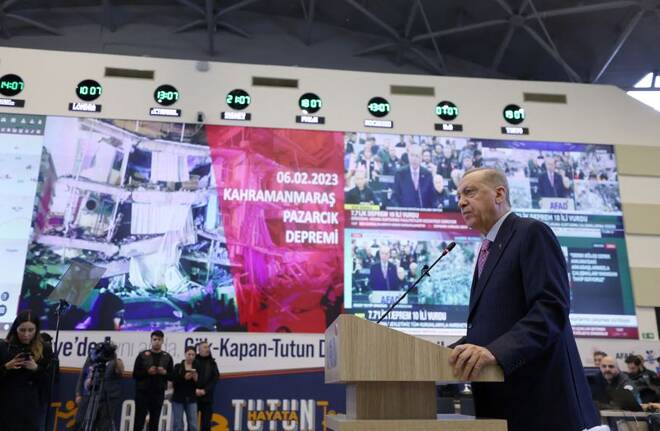Advertisement
Advertisement
Erdogan acknowledges some problems with Turkey’s quake response
By:
ISTANBUL (Reuters) - Turkish President Tayyip Erdogan said on Wednesday there were some problems in the initial response to the massive earthquakes that struck southern Turkey but operations are back to normal now, adding that the death toll in the country rose to 8,574.
ISTANBUL (Reuters) -President Tayyip Erdogan acknowledged on Wednesday some problems with Turkey’s initial response to the earthquake that rocked the south but said normal operations have resumed, adding that the death toll in the country rose to 8,574.
Erdogan made his first visit to the devastated region since the Monday, when two massive quakes hit within hours, just as confirmed deaths in Turkey and neighbouring Syria shot beyond 11,000.
Speaking to reporters in the Kahramanmaras province near the epicentre, with constant ambulance sirens in the background, Erdogan said there had been problems with roads and airports but that everything would get better by the day.
“On the first day we experienced some issues but then on the second day and today the situation is under control,” he said.
The government aims to build housing within one year for those left without a home in the 10 provinces affected, he added.
The most destructive in decades, the initial tremor wrought havoc on hospitals, airports and roads, and knocked down more than 6,400 buildings in Turkey. Many residents have since complained about insufficient resources and slow emergency response.
“We had some problems in airports and roads but we are better today. We will be better tomorrow and later. We still have some issues with fuel…but we will overcome those too,” Erdogan said after visiting tents set up by the Disaster and Emergency Management Authority (AFAD).
He also said citizens should only heed communication from authorities and ignore “provocateurs”.
Turkish authorities say some 13.5 million people were affected in an area spanning roughly 450 km (280 miles) from Adana in the west to Diyarbakir in the east.
(Reporting by Ali Kucukgocmen and Ezgi Erkoyun; Editing by Jonathan Spicer)
About the Author
Reuterscontributor
Reuters, the news and media division of Thomson Reuters, is the world’s largest international multimedia news provider reaching more than one billion people every day. Reuters provides trusted business, financial, national, and international news to professionals via Thomson Reuters desktops, the world's media organizations, and directly to consumers at Reuters.com and via Reuters TV. Learn more about Thomson Reuters products:
Did you find this article useful?
Latest news and analysis
Advertisement
